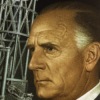Edwin Powell Hubble

Edwin Powell Hubble
Edwin Powell Hubble was an American astronomer who played a crucial role in establishing the field of extragalactic astronomy and is generally regarded as one of the most important observational cosmologists of the 20th century. Hubble is known for showing that the recessional velocity of a galaxy increases with its distance from the earth, implying the universe is expanding, known as "Hubble's law" although this relation had been discovered previously by Georges Lemaître, who published his work in a less...
NationalityAmerican
ProfessionScientist
Date of Birth20 November 1889
CountryUnited States of America
Edwin Powell Hubble quotes about
Equipped with his five senses, man explores the universe around him and calls the adventure Science.
We do not know why we are born into the world, but we can try to find out what sort of a world it is - at least in its physical aspects.
Past time is finite, future time is infinite.
All nature is a vast symbolism: Every material fact has sheathed within it a spiritual truth.
Equipped with our five senses - along with telescopes and microscopes and mass spectrometers and seismographs and magnetometers and particle accelerators and detectors sensitive to the entire electromagnetic spectrum - we explore the universe around us and call the adventure science.
The history of astronomy is a history of receding horizons.
I knew that even if I were second or third rate, it was astronomy that mattered.
The universe is unfolding as it should.
With increasing distance, our knowledge fades, and fades rapidly. Eventually, we reach the dim boundary-the utmost limits of our telescopes. There, we measure shadows, and we search among ghostly errors of measurement for landmarks that are scarcely more substantial. The search will continue. Not until the empirical resources are exhausted, need we pass on to the dreamy realms of speculation.
Astronomy is something like the ministry. No one should go into it without a call. I got that unmistakable call, and I know that even if I were second-rate or third-rate, it was astronomy that mattered.
Wisdom cannot be directly transmitted, and does not readily accumulate through the ages.
Science is the one human activity that is totally progressive.
Not until the empirical resources are exhausted, need we pass on to the dreamy realms of speculation.
The great spirals, with their enormous radial velocities and insensible proper motions, apparently lie outside our Solar system.